|
|
|
Sort Order |
|
|
|
Items / Page
|
|
|
|
|
|
|
| Srl | Item |
| 1 |
ID:
174334
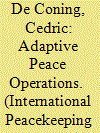

|
|
|
|
|
| Summary/Abstract |
Complexity theory offers a theoretical framework for analysing how social systems prevent, manage and recover from violent conflict. Insights from complexity suggest that for a peace process to become self-sustainable, resilient social institutions need to emerge from within, i.e. from the culture, history and socio-economic context of the relevant society. Peace operations are deployed to contain violence and to facilitate this process, but if they interfere too much, they will cause harm by inadvertently disrupting the very feedback loops critical for self-organization to emerge and to be sustained. To navigate this dilemma, the paper proposes employing an adaptive approach, where peace operations, together with the communities and people affected by the conflict, actively engage in an iterative process of inductive learning and adaptation. Adaptive Peace Operations is a normative and functional approach to peace operations that is aimed at navigating the complexity inherent in trying to nudge societal change processes towards sustaining peace, without causing harm.
|
|
|
|
|
|
|
|
|
|
|
|
|
|
|
|
| 2 |
ID:
172844
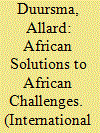

|
|
|
|
|
| Summary/Abstract |
The current scholarly literature on the international mediation of civil wars draws predominantly on a rationalist-materialist perspective. This perspective suggests that the ticket to mediation success is the material manipulation of the bargaining environment by third parties with a high degree of economic and military resources. I argue that legitimacy also determines outcomes of mediation because if a mediator has legitimacy, it can continue to look for a mutually satisfactory outcome and try to pull the conflict parties toward compliance. I show that legitimacy matters by systematically comparing the effectiveness of African and non-African third parties. African third parties are typically considered ineffective because of a low degree of economic and military capacity. However, they effectively mediate civil wars in Africa because of a high degree of legitimacy, which is a result of a strong conviction within the African society of states that African mediation is the most desirable type in conflicts there. Drawing on data from the Uppsala Conflict Data Program supplemented with unique data, which together cover all mediation efforts in Africa between 1960 and 2017, I find quantitative evidence supporting the effectiveness of African third parties. Compared to non-African ones, African third parties are far more likely to conclude negotiated settlements that are more likely to be durable. African third parties are especially effective if the conflict parties are highly committed to the African solutions norm. Theoretically, this study deviates from much of the literature that puts forward solely rationalist-materialist explanations of mediation success. By bringing legitimacy to the forefront, this article supplements the current mediation literature that emphasizes material sources of power and ignores social structures.
|
|
|
|
|
|
|
|
|
|
|
|
|
|
|
|
| 3 |
ID:
119719
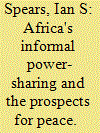

|
|
|
|
|
| Publication |
2013.
|
| Summary/Abstract |
Power-sharing and inclusion continue to inform contemporary approaches to conflict resolution and post-conflict governance in Africa. But aside from power-sharing efforts in relatively well-institutionalized countries such as South Africa and Rhodesia/Zimbabwe, most efforts at formal inclusion have been short-lived. Indeed, many high-profile experiences in power-sharing governments have been failures. African governments and opposition groups do engage in inclusion, but, owing to the non-institutionalized nature of African politics, it is almost always directed toward more limited short-term objectives such as regime survival or material reward that comes with participation in peace processes. Surveying Africa's experience with power-sharing, this article argues that inclusion continues to be a fragile basis on which to build peace.
|
|
|
|
|
|
|
|
|
|
|
|
|
|
|
|
| 4 |
ID:
129442
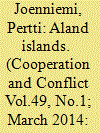

|
|
|
|
|
| Publication |
2014.
|
| Summary/Abstract |
The Åland Islands received their co-sovereign standing from the League of Nations in 1921, the settlement of a Finnish-Swedish dispute. The clash was over ownership, and the league advocated that Åland should remain part of Finland, albeit elevated to the status of a self-governing polity. The verdict implied that Finland's sovereignty was significantly compromised, whereas the islands landed in an in-between situation, being neither local nor fully sovereign. The duality of Åland - remaining an integral part of Finland yet still distinct with a standing of its own, including various cultural and linguistic safeguards - meant more generally that the islands fall through the interstices of the dominant discourses pertaining to political space. However, the lack of any clear conceptual standing has not amounted to anything profoundly disadvantageous. Their liminal nature of being neither this nor that has instead furnished the islands with a rather favourable posture. Their standing, although initially perceived as a loss and still seen in some interventions as unwarranted and viewed as a source of ontological uncertainty, arguably accounts for their ability to transform what usually appears as weakness into a considerable degree of influence. The article thus aims to explore what explains such an outcome and the manner in which the ambiguity of the islands has stood the test of time, taking into account that their standing has, among other things, been impacted by Finland and the islands both joining the EU in 1995 and the sovereignty games involved.
|
|
|
|
|
|
|
|
|
|
|
|
|
|
|
|
| 5 |
ID:
077537
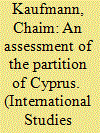

|
|
|
|
|
| Publication |
2007.
|
| Summary/Abstract |
This paper proposes a standard for evaluation of possible solutions to communal conflicts, including partition, based on protection of human life. A partition should be judged successful only if it costs fewer lives than the expected loss of life under any alternative. Solutions to communal conflicts should also be stable over long periods, eliminating or drastically reducing fears of people in the affected communities that they could become victims of renewed violence. An assessment of the 1974 partition of Cyprus is presented, which finds that its net impact on human life remains uncertain-principally because the partition occurred so quickly after the July 1974 coup by Greek Cypriot ultra-nationalists that was the main source of fear of very large-scale ethnic cleansing that we cannot know what the new government might have done. What we can confidently say is that, absent partition, deadly communal violence in Cyprus would have continued to recur and that there are grounds, including the behavior of the July coup regime, for guessing that the ultimate cost would more likely have been higher rather than lower than that of partition. Partition has also enforced peace on Cyprus for 32 years, which may have contributed to the improved climate, compared with 30 or 10 years ago, for eventual reunification
|
|
|
|
|
|
|
|
|
|
|
|
|
|
|
|
| 6 |
ID:
002522
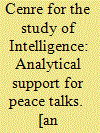

|
|
|
|
|
| Publication |
USA, Centre for the Study of Intelligence, 1992.
|
| Description |
v,48p.
|
|
|
|
|
|
|
|
|
|
|
|
Copies: C:1/I:0,R:0,Q:0
Circulation
| Accession# | Call# | Current Location | Status | Policy | Location |
| 033956 | 327.172/ANA 033956 | Main | On Shelf | General | |
|
|
|
|
| 7 |
ID:
131480
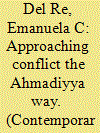

|
|
|
|
|
| Publication |
2014.
|
| Summary/Abstract |
The role and incidence of the Ahmadiya community in Israeli society, with its around 2,000 members, is not related to the dimension of the community, its religious activities or its dissemination on the territory. It is related to the strong social and political engagement of the community not only in religious but also in civil society activities where it resides, despite all the difficulties that derive from its disputed role in Islam. The Ahmadiyya community in Haifa constitutes a relevant example of contribution to peaceful and productive coexistence. Haifa itself is characterized by a very interesting social and political climate, by which it is considered a "model" of coexistence in Israel, despite the fact that many contrasts and contradictions persist, such as forms of discrimination and inequalities. The civil society is particularly active, and institutions and NGOs devoted to the Arab-Jewish dialogue are many. Religious and political leaders communicate and participate together in various events, where their openness and mutual respect are intended to symbolize harmony with the intent of this being mirrored by the whole society. The Ahmadiyya Community plays an active role in this evolving process. The author, who has carried out qualitative research in Haifa to film a scientific documentary on the Holiday of Holidays and the validity of the Haifa model of coexistence, applied participant observation in the framework of grounded theory to analyze the role and impact of the Ahmadiyya community in the complex Israeli context, also on the basis of extensive in depth interviews with community members and leaders
|
|
|
|
|
|
|
|
|
|
|
|
|
|
|
|
| 8 |
ID:
113621
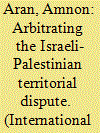

|
|
|
|
|
| Publication |
2012.
|
| Summary/Abstract |
Breaking the current deadlock in the Israeli/Palestinian conflict has thus far proved impossible. However, the suggestion that arbitration should replace negotiations is flawed.
|
|
|
|
|
|
|
|
|
|
|
|
|
|
|
|
| 9 |
ID:
143296
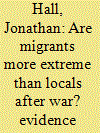

|
|
|
|
|
| Summary/Abstract |
Little is known about the attitudes of migrant populations originating from countries affected by conflict. This article examines a key assumption in the literature: that migrants harbor more conflictive attitudes than locals after war. Until now, we simply lacked the micro-level data necessary to examine migrant attitudes directly. Rather than relying on indirect evidence, I analyze new data from simultaneous surveys conducted in Sweden and Bosnia in 2010. As a whole, the empirical analysis supports the article’s novel theoretical approach. Under certain conditions, migration may promote inclusive and reconciliatory attitudes by improving access to coping resources and providing an exit from detrimental wartime and postwar conditions in origins countries.
|
|
|
|
|
|
|
|
|
|
|
|
|
|
|
|
| 10 |
ID:
126015


|
|
|
|
|
| Publication |
2013.
|
| Summary/Abstract |
Before the 1990s, very little research had been done on the religious dimension in the dynamics of internal and international violent conflicts. Two factors may explain this: first, the lack of interest of a good part of international theory in peace research and conflict resolution in particular; and, second, the negative impact of the division between the major disciplines of social sciences and area studies. This article takes this insufficiency as its starting point and assumes that the factors of greatest value in explaining violent conflict are diverse (political, economic or social processes), and to speak of a single factor (religion) in isolation makes little sense if it is not contextualized within a metatheory. Thus, the article presents several elements that are derived from the theory of conflict resolution and area studies on the Middle East and North Africa region, and which should be taken into consideration when examining the extent to which religion contributes to violent conflicts and their evolution.
|
|
|
|
|
|
|
|
|
|
|
|
|
|
|
|
| 11 |
ID:
046546
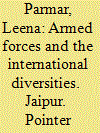

|
|
|
|
|
| Publication |
Jaipur, Pointer publishers, 2002.
|
| Description |
xxviii, 329p.
|
| Standard Number |
8171322972
|
|
|
|
|
|
|
|
|
|
|
|
Copies: C:1/I:0,R:0,Q:0
Circulation
| Accession# | Call# | Current Location | Status | Policy | Location |
| 045423 | 355/PAR 045423 | Main | On Shelf | General | |
|
|
|
|
| 12 |
ID:
060616
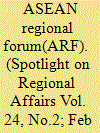

|
|
|
| 13 |
ID:
061155
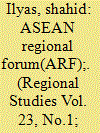

|
|
|
|
|
| Publication |
Winter 2004-05.
|
|
|
|
|
|
|
|
|
|
|
|
|
|
|
|
| 14 |
ID:
154710
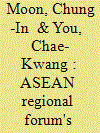

|
|
|
|
|
| Summary/Abstract |
The Association of Southeast Asian Nations Regional Forum has introduced the Experts and Eminent Persons system as a security affairs–related epistemic community in Asia Pacific. However, its performance has remained rather stagnant. This article assesses its performance by examining achievements and limitations of the system and identifies barriers to its effective functioning. The findings attribute its dismal performance to skewed composition and poor quality of membership, lack of depth and diversity of expertise and knowledge, absence of knowledge sharing or diffusion function, and negligible policy impact. The article suggests ways to improve the performance of the ARF-EEPs, and concludes by offering theoretical, empirical, and policy implications.
|
|
|
|
|
|
|
|
|
|
|
|
|
|
|
|
| 15 |
ID:
064493
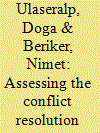

|
|
|
| 16 |
ID:
182619


|
|
|
|
|
| Summary/Abstract |
A theoretical gap in the audience cost theory is the missing analysis of its central feature: the audience. This article defines the audience as a group composed of individuals and societal actors that can punish a government and pay attention to the issue being negotiated. Thus, the audience can vary depending on the issue salience. When the issue salience is low, the audience comprises just interest groups and the attentive public. Yet, the higher the issue salience, the more voters of the general public also become part of the audience. The audience’s composition in turn determines the level of the audience costs. Because the general public tends to evaluate national honor more highly, be less informed and have less well-defined preferences than interest groups and the attentive public, the audience costs should be higher when the issue salience is high. Furthermore, the audience can take actions that prevent the effect of audience costs or generate exogenous audience costs.
|
|
|
|
|
|
|
|
|
|
|
|
|
|
|
|
| 17 |
ID:
152322


|
|
|
|
|
| Summary/Abstract |
In 2011, the Australian Defence Force Academy became embroiled in a sex scandal when a cadet made public, claims of abuse. Her claims led to a number of inquiries, which unveiled many other historical abuse claims. As such, this case revealed some of the potential problems associated with the containment of such disputes. To explore this further, a brief review of workplace changes (1930–present) was conducted, which highlighted the development of current containment measures. This was followed by a two-pronged case analysis of the 2011 Australian Defence Force Academy Skype sex scandal. Boltanski’s process theory was used in conjunction with Bourdieu’s field theory to study the containment of the case. Combined, these analyses revealed that, while a focus on the central players and their relations as psychologized/personal is a main strategy for containment, this approach can deflect attention from other factors that play important roles, resulting in more significant, far-reaching problems.
|
|
|
|
|
|
|
|
|
|
|
|
|
|
|
|
| 18 |
ID:
082448


|
|
|
|
|
| Publication |
2008.
|
| Summary/Abstract |
Secret back-channel communication is often employed in severe conflict to explore the feasibility of front-channel negotiation. It can also be used as an adjunct to front-channel negotiation when talks become deadlocked or as a substitute for front-channel negotiation. Its value lies partly in the flexibility and future orientation it brings to talks. In the prenegotiation phase, it also provides political cover, is cost-effective, does not require formal recognition of the adversary, and allows communication with adversaries who do not meet preconditions for negotiation such as a cease-fire. Intermediaries and intermediary chains are sometimes used in back-channel communication. Heavy reliance on back-channel communication can produce flimsy agreements that are too narrowly based or fail to deal with major issues. But this problem can be avoided if enough time is spent assembling a broad central coalition
|
|
|
|
|
|
|
|
|
|
|
|
|
|
|
|
| 19 |
ID:
080802
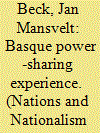

|
|
|
|
|
| Publication |
2008.
|
| Summary/Abstract |
Neither the devolution of powers to the Basque Autonomous Community in Spain nor more than a decade of power-sharing within this region has led to a peaceful settlement of the Basque conflict. Combining Kriesberg's approach to conflict resolution and consociational theory, past power-sharing experiences are analysed. The lack of overarching loyalties, traditions of compromise, comprehensive participation and the continuation of violence have frustrated power-sharing. After the 2006 ceasefire, the conditions for giving the conflict a constructive turn have not fundamentally changed. The potential for alternative forms of power-sharing as a way out of the Basque conflict, combined or not with innovative territorial arrangements cannot be employed because of multi-scale polarisation. De-escalation as a prerequisite for new types of power-sharing arrangements requires relearning democratic pluralism and a recognition of ethnic hybridity in this politically and geographically fragmented society
|
|
|
|
|
|
|
|
|
|
|
|
|
|
|
|
| 20 |
ID:
172329


|
|
|
|
|
| Summary/Abstract |
How does diffusion of civil war battles influence conflict termination? Recent advances in civil war literature have found that battle dynamics shape conflict termination by affecting the intra-conflict bargaining between disputants. This article extends the theoretical perspective and argues that how battles diffuse matters in determining conflict termination. While battlefield dynamics should in principle reveal previously unavailable private information, the relevance of information-revealing effect depends on the diffusion patterns of battles. The persistent, and possibly battle-exacerbated, commitment problem can also alter the prospects of conflict termination. We test the argument by distinguishing two distinct diffusion patterns of battles: distant and proximate. The empirical results reveal that distant diffusion, but not proximate diffusion, of battles makes civil conflicts less likely to terminate. The analysis also demonstrates that incorporating diffusion dynamics significantly improves our ability to predict conflict termination.
|
|
|
|
|
|
|
|
|
|
|
|
|
|
|
|
|
|
|
|
|